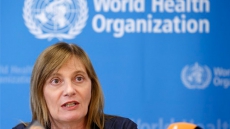OTTAWA - The tangle of lists that Canadian banks and other financial institutions rely on to sanction terrorists, tyrants and other troublemakers are confusing and often out of date, industry players are telling the federal government.
The complaints have prompted a federal plan to create a single, comprehensive roster of targeted people and organizations, records released under the Access to Information Act show.
Businesses currently use 19 different lists from five domestic and international websites to ensure the freezing or seizure of assets linked to certain individuals and entities in countries including Iran, North Korea and, most recently, Russia and Ukraine.
Although governments and the United Nations have applied various types of sanctions for many years, they have only become a significant factor in the Canadian financial sector since the 9/11 terrorist attacks on the United States, the federal government says.
That has added up to more work for banks, credit unions and others working in global finance.
Private-sector members of a federal advisory committee on anti-money laundering measures and terrorist financing have expressed concerns about the burdensome requirements involved in monitoring lists of hundreds of names.
At a May 2013 committee meeting, the Finance Department circulated a draft plan to address grievances including:
— Lack of a consolidated, downloadable list of people and entities subject to targeted financial sanctions in Canada;
— Concerns with the lists issued by the Office of the Superintendent of Financial Institutions;
— A need for "systematic and timely" updates to all current lists;
— Numerous reporting requirements of frozen assets for different sanction regulations;
— Minimal — if any — compliance guidance to the private sector.
Officials told a follow-up meeting last November that the item would remain on the committee's to-do list "until the problem is resolved."
"Progress is being made on developing a single website with all relevant sanctions information," internal notes released under the access law say. "The United Nations (UN) is also working to improve how they produce and disseminate sanctions lists."
In the federal budget delivered in February the government promised regulatory or legislative changes to make the system more effective and reduce the compliance burden on companies.
The government is in the process of "reviewing options" to improve its sanctions regime, Finance Department spokeswoman Stephanie Rubec said in an emailed statement.
"We hope to have a successful resolution to this issue in the coming months."
The Department of Foreign Affairs, which has taken the lead on the initiative, did not respond to questions about the project Thursday.
The Canadian Bankers Association would welcome any initiative to simplify the process for financial institutions, said spokeswoman Kate Payne.
"Compliance requires considerable resources, but we also fully understand and support the necessity of these sanctions and measures."





